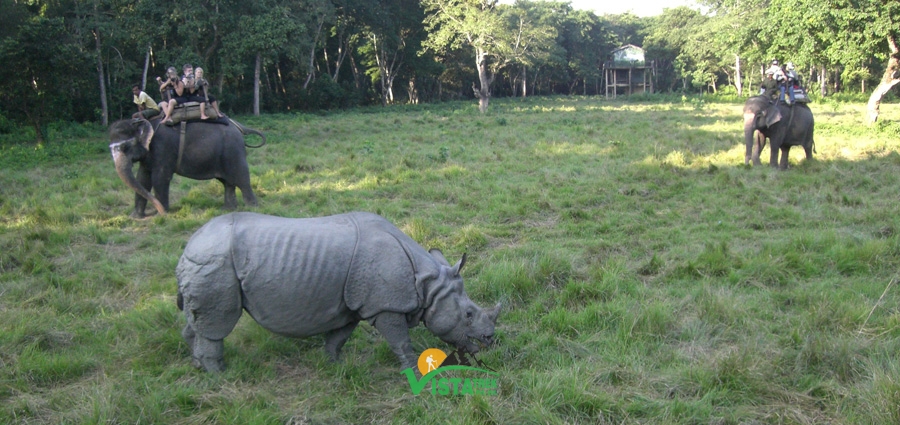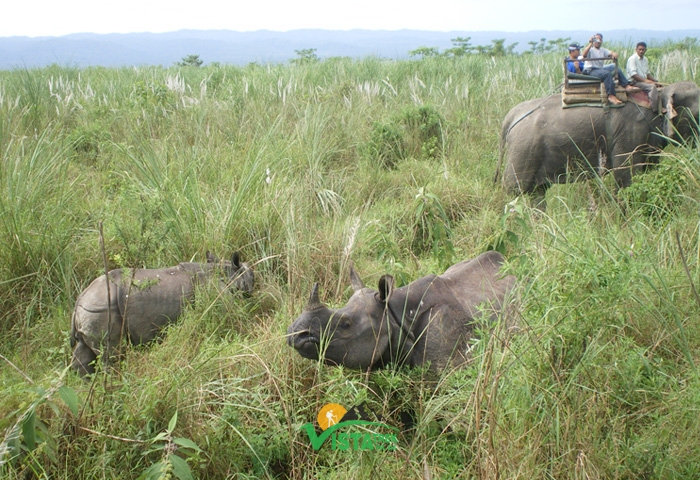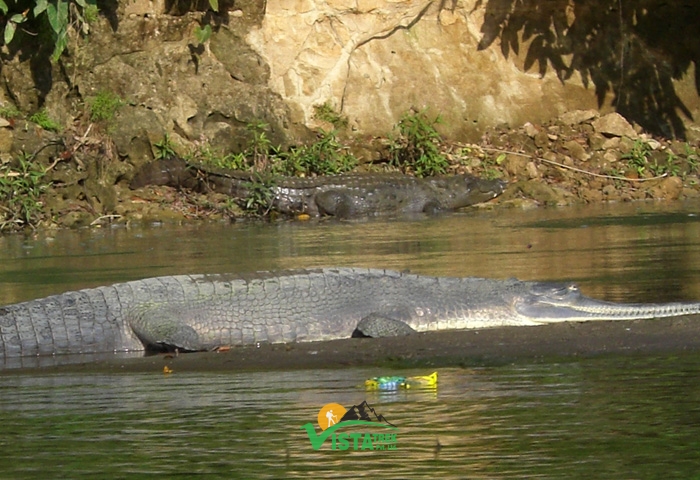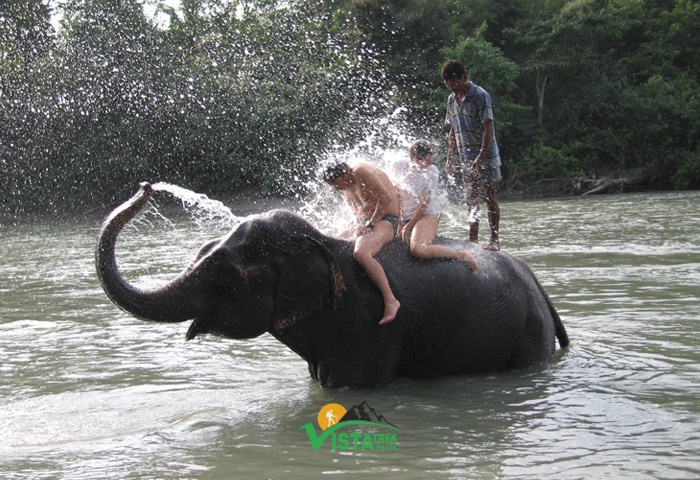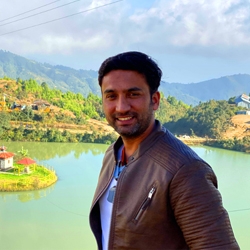Trip Facts
- Duration 5 Days
- Start FromKathmandu
- Group Size1-10 Pax
- End FromKathmandu
- Trip GradeEasy
- Max Height 1350 m
- AccommodationHotel/Resort
- TransportationBus/Private Car/Flight
Best Season
October to May.
Trip Highlights
- A UNESCO Natural World Heritage Site
- A National Park covering 932 square kilometres and home to 56 species of mammals, 450 species of birds, 119 species of fish, 590 species of butterflies and 47 species of reptiles
Trip Overview
Located in the south-central region of Nepal, Chitwan National Park is the oldest national park of the nation. Covering a total of 952.63 km2,the national park is a UNESCO world heritage site and also hosts the Ramsar site of Beeshazari Lakes. An ideal destination for wildlife enthusiasts the national park is home to one-horned rhino, sloth bears, Langur monkeys, wild boars, leopards, jungle cats, and the majestic Royal Bengal Tiger. In addition to the varied species of animals, the park is home to over 500 different species of birds including the endangered Bengal florican, Grey-crowned Prinia, and Swamp francolin. Home to the ethnic Tharu, the region is also known for hosting Gharial and Mugger crocodiles alongside the Rapti- Narayani River system. One of the famous tourist destinations in Nepal, Chitwan National Park can be enjoyed through different activities like jeep safari, elephant safari, and canoeing.
Trip Itinerary
- Upon arrival at Tribhuwan Intl Airport in Kathmandu, meet a representative from Vista Trek waiting to receive you.Once reaching your hotel in a car from the airport, check in and enjoy the refreshment served.
- Visit the Vista Trek office for discussion on tour, and settlement of dues if any.Since you will still have some time left for a walk around Thamel, do so if you please.
- Head off to Chitwan early morning on a tourist bus. Stopping only for breakfast, the vehicle comes to a stop at Sauraha in Chitwan.A representative from your hotel is responsible for making the necessary arrangements for your10 minute travel to the hotel. In the hotel, lunch is ready for youby 1.30 pm along with your accommodation arrangements aimed sincerely at making that stay comfortable.
- At around 4 in the afternoon, take a tour of the Tharu Village. If time is a resource, it would justify the return on investment if these moments are spent solely on understanding the Tharu way of life. It is very possible for their one or the other aspect to touch you in a way or another.
- 6 in the evening, a Tharu stick dance invites your attention. An attendance usually pays well largely because the energy in the dance is bound to touch all involved: the performers, the organisers as well as the audience.
- Spend the night in the hotel.
- After breakfast, canoeing in the Rapti River, which has chosen to meander through the Chitwan National Park, is an experience only you can rightfully define. Each year for the past five, the conservation area has been alluring almost half a million enthusiasts seeking a safari experience. It is, however, not only the indigenous Tharu community residing in the buffer zone perhaps with some conflicts now and then with the wildlife first then with the authoritybut also the whole Himalayan subtropical broadleaf forest with its lush green vegetation with the purest strands of sal densely covering the well-drained lowland centre, interspersed with chir pine along the southern face of the Churia Hills, association with rosewood, axlewood, elephant apple, grey downy balsam, Bauhinia vahlii as well as Spatholobus parviflorus on the northern face with the catechu and rosewood predominant, kapok, rhino apple tree, velvety beautyberry, hill glory bower and gooseberry includinga wide range of other species on the recently deposited alluvium of this riverine forest with its mosaic ever-changing due largely to the seasonal bushfires, flooding and some erosion with elephant grass, giant cane, khagra reed as well as a number of species of true grasses on the Terai-Daur savanna and grasslands that make up 20% of the National Park as well as many of those categorized with a belief to fit in the remaining of the living kind many species of butterflies, moths and insects starred tortoises, monitor lizards along with 19 species of snakes including the king cobra and rock python the basking gharials and mugger crocodiles together with 113 species of fish all in their preferred habitat at least until their fellow humans decide otherwisethe smooth-coated otters, Bengal foxes, spotted linsangs, honey badgers, striped hyenas, wild dogs, golden jackels, fishing cats, jungle cats and the crab-eating mongooses, a group that seems to have received lesser attention in comparison to their celebritized members the Bengal Tiger, the Greater One-Horn Rhino, the Wild Elephant, the Leopard and the Sloth Bear.
- With even the prey not only the predator comfortable with each other's co-existence, it is the wild and the ways of the wilderness that have all made Chitwan National Park their sanctuary (our perspective), home (theirs).
- After spending about an hour on the river, a Class 1 liquid highway, it's time for a short walk to the Elephant Breeding Centre. It requires a close inspection to gain some insight into the ways of the Elephant.
- Back in the hotel at 1 pm, lunch awaits fresh and ready with the potential to satisfy most returning from this trip.
- Once the clock strikes three, an elephant ride is what you get to experience. In the jungle, the sight of a rhino or a few, some boars together, a bear occasionally and some birds and the vegetation always is what you get to see from your vantage point, the back of an elephant.
- Dinner at 9, and while many call it a day, some still find it easy to gather some energy to invest in an activity of preference, reading a novel, writing a diary, sharing one's personal interactions with the surrounding they have deliberately chosen to be in, and the like.
- Early rise at around 6, and the morning greets us with a cup of refreshing tea or coffee. After finishing their choice of the two drinks, many prefer to engage in an early morning activity commonly known as bird watching. After all, the banks of Rapti River are teeming with many species of birds every morning.
- This breakfast at 8.30 is the last thing you'll be doing if you go by this itinerary. 9.30 is our official departure time. If you are looking for more options, however, you could check out the ones below.
- Back in Kathmandu the same route, and only our WILLshall dictate our involvement or indulgence as we may please.
Meeting the crocodiles basking in the sun in their preferred habitat is an experience that perhaps allows for a sensible interaction.
Extensions
JEEP SAFARI
Into the jungle Main, this jeep safari is for those seeking a deeper look into the Himalayan subtropical broadleaf forest.
Possibilities for an encounter
| The animal kingdom |
Your chances of an encounter |
|
the Greater One-Horn Rhino |
Almost always |
|
the Bengal Tiger, the Wild Elephant, the Leopard and the Sloth Bear |
If you are lucky |
|
striped hyenas, wild dogs, golden jackels, fishing cats, jungle cats and the crab-eating mongooses, |
I wish you could |
|
the smooth-coated otters, Bengal foxes, spotted linsangs, honey badgers, |
Maybe |
|
the basking gharials and mugger crocodiles together |
Always unless you doze off for some reason |
|
113 species of fish |
Not all of them but always with some unless you give a damn to those fishes |
|
starred tortoises, monitor lizards |
Almost always if you go by my ratings of probability and I'm the who-cares type |
|
19 species of snakes including the king cobra and rock python |
If you happen to be one of those far and few |
|
many species of butterflies, moths and insects |
Some of them for certain. You can't miss some even if your intention is otherwise |
|
The Plant Kingdom |
Your chances of an encounter |
|
elephant grass, giant cane, khagra reed as well as a number of species of true grasses |
It would be insane not to see them, but understanding them is, of course, a different matter altogether. You know what I mean. |
|
the catechu and rosewood predominant, kapok, rhino apple tree, velvety beautyberry, hill glory bower and gooseberry |
|
|
a wide range of other species |
Always, but depends largely on the WILL of the traveler. So, my rating of probability? Can't really say. How can I vouch for someone else? |
|
sal interspersed with chir pine along the southern face of the Churia Hills |
|
|
sal's association with rosewood, axlewood, elephant apple, grey downy balsam, Bauhinia vahlii as well as Spatholobus parviflorus on the northern face |
Your Safari guide will certainly let you know about this |
|
the purest strands of sal densely covering the well-drained lowland centre, |
If you choose this safari, always |
Half-day safari: Starts 1 pm Ends 5 pm
The level of possibility mentioned above is for this safari.
Full-day safari: Starts early morning Ends 5 pm
As this safari goes deeper inside the National Park, double the level of possibility mentioned on the scale of probability above.
Cost Includes
- Pick up and transfer by car from Airport-Hotel-Airport.
- 2 nights deluxe hotel accommodation in Kathmandu.
- 2 night Hotel/Resort in Chitwon with Breakfast, lunch and dinner with tea/Coffee.
- Local Junlge Guide in Chitwon
- All local transportation.
- All necessary permits and entry fees of Chitwon National Park.
- All government taxes.
- Our service charge.
Cost Excludes
- Meals in Kathmandu except breakfast.
- International airfare.
- Nepal entry visa fee ($40).
- Your travel insurance (should include your medical and rescue)
- Any personal expenses.
- Bar bill in Chitwon
- Staff & driver tipping
Useful Info
About Accommodation.
In Kathmandu, we will accommodate you at Hotel Sapana Garden, and In Chitwon at Hotel Parkland Hotel/ Eden Jungle Resort or similar standard Hotel. Hotel comes with private bathroom, Shower and all facilities.
About Meal
You can enjoy typical Nepali food as well as continental , Italian, Indian and Tibetan meal included in the package in Chitwon. In Kathmandu, only breakfast is provided. If you are a vegetarian or vegan, no worries, Nepal is such a easy place to get several vegetarian options.
About Staff:
Local jungle Guide and driver will assist you during the Chitwon Trip. If you will specific language speaking guide, please kindly inform us. We can provide different language speaking guide who will assist you from Kathmandu to Kathmandu.
About Insurance,
You have to obtain the travel insurance which should cover emergency evacuation and medical expenses. Some Insurance policy’s cover only up to 4000 meter, so please kindly confirm with the insurance company before you purchase it.
About Seasons
Chitwon Jungle Safari is best from November to Mary. You can do it in Monsoon (June/July/August ) however there won’t be any Jeep safari operated due to muddy way.
About Bus Drive
Highway in Nepal are safe, however sometime transport can be halted due to landslide , strike or by political issues. In such case trip itinerary will be affected. Thus, we would like to request you to add few days extra in Kathmandu. If you complete your trip smoothly, then you can enjoy your time with other activities like sightseeing, White water rafting. Jungle activities or more.


 +977 9841322985
+977 9841322985 